|
|
|
Sort Order |
|
|
|
Items / Page
|
|
|
|
|
|
|
| Srl | Item |
| 1 |
ID:
118927
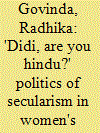

|
|
|
|
|
| Publication |
2013.
|
| Summary/Abstract |
In this paper I take the women's movement as the site for unpacking some of the strains and tensions involved in practical interpretations of secularism in present-day India. Several sources within and outside the movement point out that there has been a tendency to take the existence of secularism for granted, and that the supposedly secular idioms and symbols used for mobilizing women have been drawn from Hindu religio-cultural sources. Women from Dalit and religious minority communities have felt alienated by this. Hindu nationalists have cleverly appropriated these idioms and symbols to mobilize women as foot soldiers to further religious nationalism. Through a case-study of a grassroots women's NGO working in Uttar Pradesh, I seek to explore how women's organizations may be reshaping their agendas and activism to address this issue. Specifically, I will examine how and why the 2002 Gujarat riots affected the NGO, the ways in which it has started working on the issue of communal harmony and engaging with Muslims since the riots, and the challenges with which it has been confronted as a result of its efforts. In doing so, I will show how the complexities of NGO-based women's activism have become intertwined with the politics of secularism.
|
|
|
|
|
|
|
|
|
|
|
|
|
|
|
|
| 2 |
ID:
131130
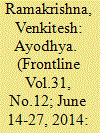

|
|
|
|
|
| Publication |
2014.
|
| Summary/Abstract |
In the new political climate, there is a pronounced assertiveness among Sangh Parivar outfits on core Hindutva programmes, including the construction of a Ram Temple in Ayodhya.
|
|
|
|
|
|
|
|
|
|
|
|
|
|
|
|
| 3 |
ID:
123091
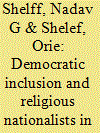

|
|
|
|
|
| Publication |
2013.
|
| Summary/Abstract |
NADAV G. SHELEF and ORIE SHELEF discuss the voting behavior of Israeli religious nationalists in the elections of 1999 and 2009. Their analysis suggests that the democratic inclusion of radical movements may not lead to moderation.
|
|
|
|
|
|
|
|
|
|
|
|
|
|
|
|
| 4 |
ID:
189069
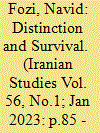

|
|
|
|
|
| Summary/Abstract |
This article argues that the notion of Iranian culture employed in the public discourse of Zoroastrians allows them to tackle the dilemma of Shiʿi-dominated Iranianness without provoking Shiʿi authorities. The piece offers an analysis of ethnographic data, including detailed speech acts documented in Zoroastrians’ ritual spaces and cultural exhibitions. It explores the Zoroastrian configuration of an Iranian culture that summons and encodes pre-Islamic tropes and modern nationalist sentiments by constantly maneuvering around national, religious, and ethnic categories. This configuration's underpinning assumptions, narratives, and texts have powerful platforms in Iranian nationalist imagination. I propose that this arrangement attempts to carve out a space for Zoroastrians’ distinct identity by connecting the history of the Muslim Arab invasion of Persia to the Shiʿi hegemonic norms of Iranian culture today. It further invokes Zoroaster's indigeneity and teachings as the foundation of authentic Iranianness to establish Zoroastrians’ survival as a cultural system.
|
|
|
|
|
|
|
|
|
|
|
|
|
|
|
|
| 5 |
ID:
141693
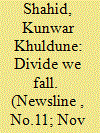

|
|
|
| 6 |
ID:
172862
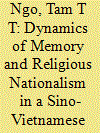

|
|
|
|
|
| Summary/Abstract |
This article analyses the dynamics of official and unofficial religious nationalism in the Vietnamese border town of Lào Cai. In 1979 it was one of many Vietnamese towns that were reduced to rubble during the short but bloody war between Vietnam and China. The normalization of Sino-Vietnamese relations in 1991 allowed a booming border trade that let Lào Cai prosper, while the painful memory of this war continued to haunt the town and the daily experiences of its residents, both humans and gods. Since the Vietnamese state forbids any official remembrance of the war, Lào Cai residents have found a religious way to deal with their war memories that skilfully evades state control. By analysing narratives about the fate of the gods and goddesses that reign in the Father God Temple and the Mother Goddess Temple—two religious institutions located right next to the border—this article shows that it is in the symbolism of the supernatural that one can find memories of the war and of the changing social landscape of Lào Cai and reconstruct its history.
|
|
|
|
|
|
|
|
|
|
|
|
|
|
|
|
| 7 |
ID:
190685
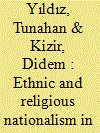

|
|
|
|
|
| Summary/Abstract |
This article compares the ideas of Hüseyin Nihal Atsız and Seyyid Ahmet Arvasi, two iconic ideologues of ethnic and religious nationalism in Turkey, respectively, on the issues of history, identity, and national ideal. It first argues that Atsız mainly presents a history of Turkish supremacism whereas Arvasi embraces a method of Islamization to remember history. It also demonstrates that Atsız tends to equate the racial and the national while Arvasi uses Islamic legitimacy for Turkish identity and nationalism. It is also evident that while Atsız offers classical pan-nationalism, Arvasi shows third-worldist and universalistic tendencies in defining Turkish destiny.
|
|
|
|
|
|
|
|
|
|
|
|
|
|
|
|
| 8 |
ID:
096281
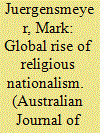

|
|
|
|
|
| Publication |
2010.
|
| Summary/Abstract |
The global rise of religious politics is found in every religious tradition, spurred on by the widespread perception that secular nationalism is an ineffective and insufficient expression of public values and moral community in a global era in which traditional forms of social identity and political accountability are radically transformed. Religious violence is an expression of this anti-secular protest and the symptom of a longing for a renewed sense of morality and values in public life.
|
|
|
|
|
|
|
|
|
|
|
|
|
|
|
|
| 9 |
ID:
095777
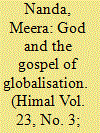

|
|
|
| 10 |
ID:
160065
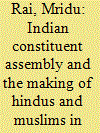

|
|
|
|
|
| Summary/Abstract |
Article 370 of the Indian constitution gives the northern province of Jammu and Kashmir special status within the union. Today that provision forms a nucleus of fierce political contention between secularists and religious nationalists in India, despite the manifest whittling down of the article's most significant aspects. This development is counterintuitive: the original intent of the article's introduction had no relation to questions of religion. This essay attempts to understand this unanticipated role, as a marker of the state's secularity or lack thereof, the article has come to play in Indian politics. It contends that the seeds were sown even at the time of shaping the Indian constitution of a perspective that viewed the people of Jammu and Kashmir according to their religious affiliations.
|
|
|
|
|
|
|
|
|
|
|
|
|
|
|
|
| 11 |
ID:
090692
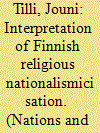

|
|
|
|
|
| Publication |
2009.
|
| Summary/Abstract |
The topic of this article is the relation between 'politicality' and theology in the discourse of Finnish religious nationalism during the Winter War of 1939-40 and the Continuation War of 1941-44. I shall draw on the ideas of Kari Palonen and Anthony D. Smith in attempting to thematise theological depoliticisation as an intrinsic element of religious nationalism. Also, I will elaborate its political significance in the Finnish context, where the role of traditional religion in the general development of nationalist thought has been particularly important. The specific focus is on how prominent representatives of the Finnish clergy related to war and nationalist claims in general. My interpretation is that their arguments were drawn from what I call the topoi of theological depoliticisation, which, at the same time, rendered the discourse extremely political.
|
|
|
|
|
|
|
|
|
|
|
|
|
|
|
|
| 12 |
ID:
096286
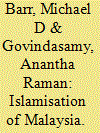

|
|
|
|
|
| Publication |
2010.
|
| Summary/Abstract |
The relationship between religious, ethnic and national identities in Malaysia has long been fraught with uncomfortable tensions-especially for the 50 percent of Malaysians who are outside the dominant Malay-Muslim communal grouping. Until the accession of Dr Mahathir to the prime ministership at the beginning of the 1980s, it was clear that ethnic identity trumped religious identity, even though being Muslim was already intrinsic to being accepted as Malay. Being a non-Malay Malaysian was to accept a subordinate, but not a drastically uncomfortable role in the nation. Since the 1980s, however, religious identity appears to have replaced ethnicity as the central element of nation identity as the society has been systematically-even aggressively-Islamised. Yet appearances can be deceiving, and there is a strong case to be made that Islamisation in Malaysia is basically a variation of the original Malay ethnonationalism, using the nearly complete symbiosis between Malay and Muslim identity as the point of articulation that allows religious nationalism to serve as a cipher for ethnonationalism-but a version of ethnonationalism that is much less accommodating of minorities than was traditional Malay nationalism. This article places contemporary events in a historical context and then focuses on just one aspect of Malaysia's program of Islamisation that is both contemporary and central to national identity-developments in the education system, and particularly within the secondary school history curriculum-to demonstrate that in this instance at least, religious nationalism is operating as a surrogate for ethnic nationalism and has, in fact, intensified ethnic nationalism by raising the stakes for the communities that are outside the core national group.
|
|
|
|
|
|
|
|
|
|
|
|
|
|
|
|
| 13 |
ID:
044006
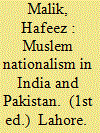

|
|
|
|
|
| Edition |
1st ed.
|
| Publication |
Lahore, People's Publishing House, 1980.
|
| Description |
xv, 355p. hbk
|
|
|
|
|
|
|
|
|
|
|
|
Copies: C:1/I:0,R:0,Q:0
Circulation
| Accession# | Call# | Current Location | Status | Policy | Location |
| 021814 | 954/MAL 021814 | Main | On Shelf | General | |
|
|
|
|
| 14 |
ID:
155865
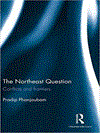

|
|
|
|
|
| Publication |
Oxon, Routledge, 2016.
|
| Description |
vii, 219p.hbk
|
| Standard Number |
9781138666931
|
|
|
|
|
|
|
|
|
|
|
|
Copies: C:1/I:0,R:0,Q:0
Circulation
| Accession# | Call# | Current Location | Status | Policy | Location |
| 059221 | 305.809541/PHA 059221 | Main | On Shelf | General | |
|
|
|
|
| 15 |
ID:
096288
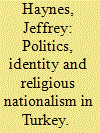

|
|
|
|
|
| Publication |
2010.
|
| Summary/Abstract |
Turkey has had an Islam-influenced government since a general election in 2002. The Justice and Development Party (Adalet ve KalkInma Partisi, abbreviated to AK Parti or AKP) won over a third of the popular vote and took power alone. A subsequent general election in 2007 saw the AKP win again with an improved 47 percent of votes cast. Over the last few years under the AKP, Turkey has often been noted for the 'moderation' of its Islam-influenced government, a positive example of the compatibility of Islam and democracy. The article focuses on Turkey's national identity and the place within it of Islam, secularism and the political role over time of the military, often judged to be the guardian of the country's secular national identity. This involves both a focus on the role and legacy of the country's nationalist founder, Mustafa Kemal Atat rk, and on the special insular and inward-looking self-selected guardian role of the military, long seen as central to national choices of the pursuit of a secular political path. The article argues that one of the defining characteristics of Turkish identity is not Islam or secularism per se. Rather, it is a pronounced, perhaps even xenophobic, fear of outsiders, including not only Westerners but also some Muslim non-Turks. The article suggests that while Islam is part of that sense of identity, it is not at its core. Moreover, if the military has its way, which at the moment seems likely, then Islam will never be allowed to be central to Turkey's sense of national identity.
|
|
|
|
|
|
|
|
|
|
|
|
|
|
|
|
| 16 |
ID:
005960
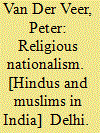

|
|
|
|
|
| Publication |
DelhI, Oxford University Press, 1996.
|
| Description |
xv, 247p.
|
| Standard Number |
0195637992
|
|
|
|
|
|
|
|
|
|
|
|
Copies: C:1/I:0,R:0,Q:0
Circulation
| Accession# | Call# | Current Location | Status | Policy | Location |
| 037399 | 320.55/VEE 037399 | Main | On Shelf | General | |
|
|
|
|
| 17 |
ID:
096279
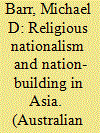

|
|
|
| 18 |
ID:
188990
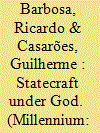

|
|
|
|
|
| Summary/Abstract |
Using Brazil as a case study, we examine ways in which radical right activists and leaders actively participate in world politics through religious nationalist narratives which operate on both national and transnational levels. We propose the existence of a particular subcategory of populist radical right (PRR) politics, which we call religious-populist radical right. Our argument is divided into three parts. First, we argue that religion provides ideational and material capabilities that have allowed the PRR to capture state institutions through elections. Second, we claim that once in power, the PRR’s governing strategy is conducted through transnational culture wars with religious overtones. Third, we argue that the PRR establishes novel patterns of international alliances to advance their vision of a new world order based on independent ethno-religious communities. By exploring the entanglements between the PRR and religious nationalism, we conclude that religion provides the radical right with the ideas, means, and social power to transform both state forms and world orders.
|
|
|
|
|
|
|
|
|
|
|
|
|
|
|
|
| 19 |
ID:
119561
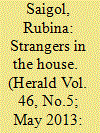

|
|
|
| 20 |
ID:
105291
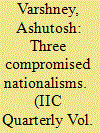

|
|
|
|
|
|
|
|